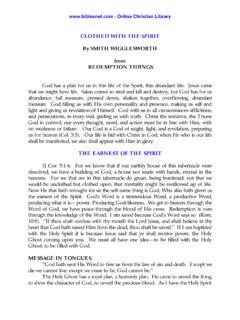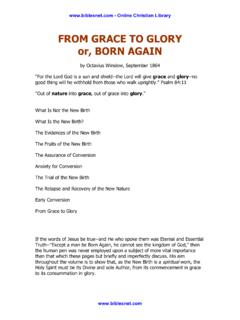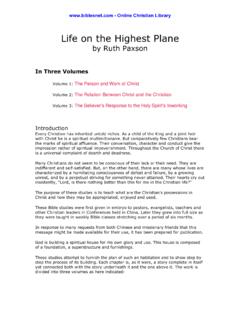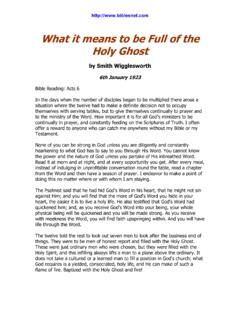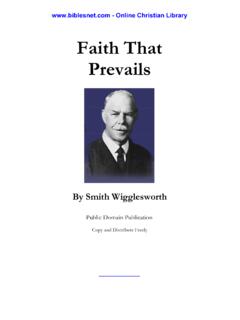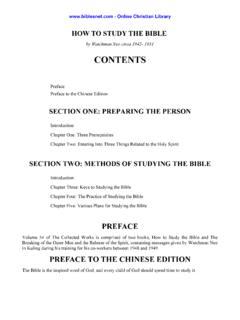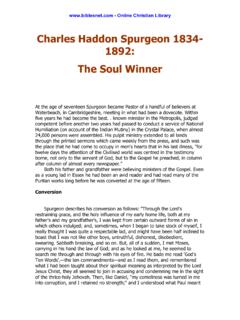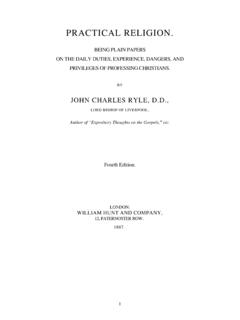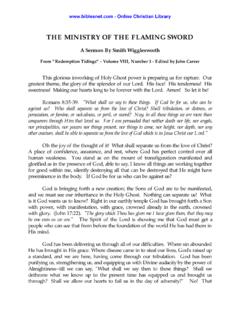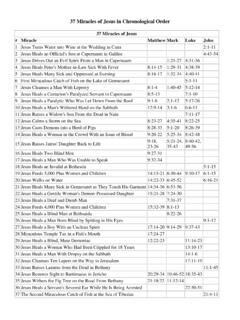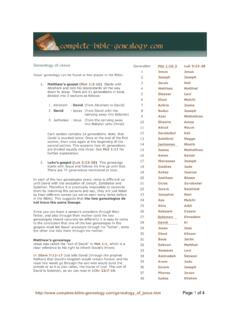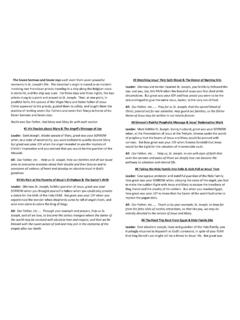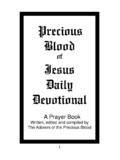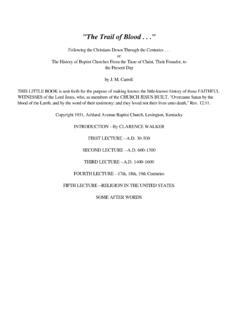Transcription of Andrew Murray The Power of the Blood of Jesus
1 The Power of the Blood of Jesus by Andrew Murray CHAPTER CONTENTS I. WHAT THE SCRIPTURES TEACH ABOUT THE Blood II. REDEMPTION BY Blood III. RECONCILIATION THROUGH THE Blood IV. CLEANSING THROUGH THE Blood V. SANCTIFICATION THROUGH THE Blood VI. CLEANSED BY THE Blood TO SERVE THE LIVING GOD VII. DWELLING IN "THE HOLIEST" THROUGH THE Blood VIII. LIFE IN THE Blood IX. VICTORY THROUGH THE Blood X. HEAVENLY JOY THROUGH THE Blood CHAPTER 1 What the Scriptures Teach About the Blood "Not Without Blood "-Heb. ix. 7 and 18. GOD has spoken to us in the Scriptures in divers portions and in divers manners; but the VOICE is ever the same, it is always the WORD of the same GOD.
2 Hence the importance of treating the Bible as a whole, and receiving the witness it gives in its various portions, concerning certain definite truths. It is thus we learn to recognise the place these truths actually occupy in Revelation, rather in the HEART OF GOD. Thus, too, we begin to discover what the foundation truths of the Bible are, which above others demand attention. Standing as they do, so prominently, in each new departure in God's revelation; remaining unchanged when the Dispensation changes, they carry a divine intimation of their importance. It is my object, in the chapters which follow this introductory one, to show what the Scriptures teach us concerning THE GLORIOUS Power OF THE Blood OF Jesus , and the wonderful blessings procured for us by it; and I cannot lay a better foundation for my exposition, nor give a better proof of the superlative glory of THAT Blood AS THE Power OF REDEMPTION, than by asking my, readers to follow me through the Bible, and thus see the unique place which is given to THE Blood from the beginning to the end of God's revelation of Himself to man, as recorded in the Bible.
3 It will become clear that there is no single scriptural idea, from Genesis to Revelation, more constantly and more prominently kept in view, than that expressed by the words-"THE Blood ." Our inquiry then is what the Scriptures teach us about THE Blood . FIRST, IN THE OLD TESTAMENT; SECONDLY, IN THE TEACHING OF OUR LORD Jesus HIMSELF; THIRDLY, IN WHAT THE APOSTLES TEACH; and LASTLY, WHAT ST. JOHN TELLS US OF IT IN REVELATION. 1. LET US LEARN WHAT THE OLD TESTAMENT TEACHES. Its record about THE Blood begins at the gates of Eden. Into the unrevealed mysteries of Eden I do not enter. But in connection with the sacrifice of Abel all is plain. He brought of "the firstlings of his lock" to the Lord as a sacrifice, and there, in connection with the first act of worship recorded in the Bible, Blood was shed.
4 We learn from Hebrews (xi. 4) that it was "by faith" Abel offered an acceptable sacrifice, and his name stands first in the record of those whom the Bible calls "believers." He had this witness borne to him "that he pleased God." His faith, and God's good pleasure in him, are closely connected with the sacrificial Blood . In the light of later revelation, this testimony, given at the very beginning of human history, is of deep significance. It shows that there can be no approach to ; no fellowship with Him by faith; no enjoyment of His favour, apart from THE Blood . Scripture gives but short notice of the following sixteen centuries. Then came THE FLOOD, which was God's judgement on sin, by the destruction of the world of mankind.
5 But God brought forth a new earth from that awful baptism of water. Notice, however, that the new earth must be baptised used also with Blood , and the first recorded act of Noah, after he had left the ark, was the offering of a burnt sacrifice to God. As with Abel, so with Noah a t a new beginning, it was "NOT WITHOUT Blood ." Sin once again prevailed, and God laid an entirely new foundation for the establishment of His Kingdom on earth. By the divine call of Abram, and the miraculous birth of Isaac, God undertook the formation of a people to serve Him. But this purpose was not o accomplished apart from the shedding of THE Blood . This is apparent in the most solemn hour of Abraham's life.
6 God had already entered into covenant relationship with Abraham, and his faith had already been severely tried, and had stool the test. It was reckoned, or counted to him, for righteousness. Yet he must learn that Isaac, the son of promise, who belonged wholly to God, can be truly surrendered to God only by death. Isaac must die. For Abraham, as well as for Isaac, only by death could freedom from the self-life be obtained. Abraham must offer Isaac on the altar. That was not an arbitrary command of God. It was the revelation of a divine truth, that it is only through heath, that a life truly consecrated to God is possible. But it was impossible for Isaac to die and rise again from the dead; for on account of sin, death would hold him fast.
7 But see, his life was spared, and a ram was offered in his place. Through the Blood that then flowed on Mount Moorish his life was spared. He and the people which sprang from him, live before God "NOT WITHOUT Blood ." By that Blood , however, he was in a figure raised again from the ahead. The great lesson of substitution is here clearly taught. Four hundred years pass, and Isaac has become, in Egypt, the people of Israel. Through her deliverance from Egyptian bondage Israel was to be recognised as God's first-born among the nations. Here, also, it is "NOT WITHOUT Blood ." the electing grace of God, nor His covenant with Abraham, nor the exercise of His omnipotence, which could so easily have destroyed their oppressors, could dispense with the necessity of THE Blood .
8 What THE Blood accomplished on Mount Moorish for one person, who was the Father of the nation, must now be experienced by that nation. By the sprinkling of the door frames of the Israelites with the Blood of the Paschal lamb; by the institution of the Passover as an enduring ordinance with the words-" When I see the Blood I will pass over you," the people were taught that life can be obtained only by the death of a substitute. Life was possible for them only through THE Blood of a life given in their place, and appropriated by " the sprinkling of that Blood ." Fifty days later this lesson was enforced in a striking manner. Israel had reached Sinai. God had given His Law as the foundation of His covenant.
9 That covenant must now be established, but as it is expressly stated in Hebrews ix. 7, "NOT WITHOUT Blood ." The Sacrificial Blood must be sprinkled, first on the altar, and then on the book of the Covenant, representing God's side of that Covenant; then on the people, with the declaration, "This is THE Blood OF THE COVENANT" (Exodus xxiv). It was in that Blood the Covenant had its foundation and Power . It is by THE Blood alone, that God and man can be brought into covenant fellowship. That which bad been foreshadowed at the Gate of Eden, on Mount Ararat, on Moriah, and in Egypt was now confirmed at the foot of Sinai, in a most solemn manner. Without Blood there could be no access by sinful man to a Holy God.
10 There is, however, a marked difference between the manner of applying the Blood in the former cases as compared with the latter. On Moriah the life was redeemed by the shedding of the Blood . In Egypt it was sprinkled on the door posts of the houses ; but at Sinai, it was sprinkled on the persons themselves. The contact was closer, the application more powerful. Immediately after the establishment of the covenant the command was givers, "Let them make me a. sanctuary that I may dwell among them " (Exod. xxv. 8). They were to enjoy the full blessedness of having they God of the Covenant abiding among them. Through His grace they may find Him, and serve Him in His house.
